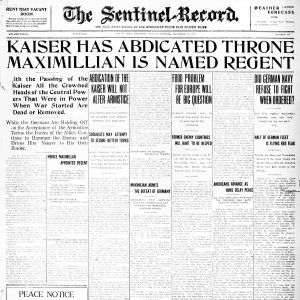calsfoundation@cals.org
Clyde Eber Palmer (1876–1957)
Clyde Eber Palmer, a businessman whose instincts for profitmaking in risky industries became legendary, owned at various times nearly forty newspapers in Arkansas and Texas, along with interests in television and radio stations and oil and gas businesses. For most of the twentieth century, Palmer and his heirs had monopoly ownership of daily newspapers in southwestern Arkansas’s largest cities, and by the beginning of the third decade of the twenty-first century, his heirs controlled most of the daily news consumption in Arkansas through their flagship newspaper, the Arkansas Democrat-Gazette, as well as small dailies. In his constant search for cost savings, Palmer brought about technological changes in newspaper production that were embraced by newspaper chains across the country. Significantly, many production jobs held by union members were eliminated. Hostility to unions remained a steadfast policy of Palmer, his heirs, and their newspapers.
Clyde E. Palmer was born on August 24, 1876, in Spirit Lake, Iowa, on the Minnesota border, to Eber and Lydia Palmer. The couple had moved to the community in 1863, six years after the Spirit Lake Massacre, a slaughter of white settlers by Dakota Sioux tribesmen following violent disputes between tribal leaders and white settlers around the lake, which the Sioux considered a sacred place. Eber Palmer became the town’s postmaster, and the couple had five children, Clyde the next to youngest. Clyde began school there before the family moved to Fremont, Nebraska, where he got a job delivering papers. He attended Fremont Business College and then landed a job as a cashier for a life insurance company and another as stenographer for a law firm.
Just as Palmer was moving to Chicago, Illinois, early in 1898, the Spanish-American War began, and he enlisted in a Nebraska regiment as a private. He apparently saw no combat, but his managing editor at the Texarkana Gazette said that he regularly received a war pension. After the war, in 1899, Palmer married Helen Maude Locke of Missouri Valley, Iowa, about forty miles south of Fremont; the wedding was held in Greenville, Texas, east of Dallas. The couple moved to Fort Worth, Texas, where he went to work for the St. Louis Southwestern Railway—later known as the Cotton Belt. They had two children and divorced in 1908. Two years later, he married Betty Maines of Shreveport, Louisiana. They had a daughter, Betty Maines Palmer.
How and why Palmer wound up in Texarkana, Texas, where he got into the newspaper business and where he spent most of the rest of his life, is in some dispute. His longtime associate and editor at the Texarkana Gazette, John Q. “Jake” Mahaffey, said Palmer moved from Fort Worth to Texarkana to become the ticket agent for the Cotton Belt and then shifted gears and became business manager of what was then known as the Texarkana Courier, the competing newspaper. Two other family versions, told by granddaughters, involved the newlyweds honeymooning in Cuba and then, while returning through Texarkana, finding that Palmer could buy stock in a paper called the Four States Press or the Texarkana Courier, in which Palmer either bought stock or else bought outright. By late 1909, he was managing the Texarkana Courier/Four States Press and soon owned it, along with an afternoon edition called the Texarkana Journal. With the help of hard times, Palmer eliminated the competition, although in the late 1920s he sold his newspapers and got out of the business, only to soon buy it all back.
By World War II, Palmer had monopolies in the other major towns of southwestern Arkansas—El Dorado (Union County), Hot Springs (Garland County), Camden (Ouachita County), and Magnolia (Columbia County)—and had a half interest in the Hope Star. They would become known as the Palmer Group. In satellite towns, he owned weekly newspapers that were printed on the daily presses. Off and on over the 1920s and 1930s, Palmer experimented with newspaper ownership in cities across the state—among them Fort Smith (Sebastian County), Jonesboro (Craighead County), Fayetteville (Washington County), and neighboring towns in Washington and Benton counties—but he apparently found the competitive situations too risky.
His daughter Betty Palmer developed journalism ambitions and attended the University of Missouri in Columbia, where the first journalism school in America had been established in 1908. There she met and married Walter E. Hussman, another journalism student from the nearby town of Bland, Missouri. Hussman’s roommate and fraternity brother was Donald W. Reynolds, who later set up shop in Fort Smith—he owned the Fort Smith newspapers—and went on to build another media empire that stretched to the West Coast.
Aside from his media empire, Palmer also played a role in dealing with the economic and social upheaval in Arkansas’s farm belt in the 1930s, when alternating floods and droughts, combined with a general economic collapse, left tens of thousands of working farmers across the state destitute. The Franklin Roosevelt administration enacted the Agricultural Adjustment Act, but little relief money reached the actual farm laborers—tenant farmers and sharecroppers and their families—leading to the organization of the Southern Tenant Farmers’ Union to advocate for these people. Governor Junius Marion Futrell, who had first addressed the economic crisis by cutting Arkansas’s already meager taxes, finally responded by creating the Arkansas Farm Tenancy Commission and appointing Palmer chairman of the businessmen’s group and its spokesman. The Arkansas crisis and the commission’s work attracted national coverage.
The commissioners, largely conservative anti-union business leaders like Palmer, issued a report that declared that the whole system of tenant farming, in which landowners leased land to laborers to do the planting and harvesting but kept nearly all the income, had “become a serious menace to American institutions, and threaten[ed] the fertility of the soil and the character of the people.” Its report recommended that the federal government create a homestead policy that supplied credit for tenant farmers to buy their own land to farm and then—astonishingly for such a conservative group—it advocated that the federal government pay for healthcare and adult education for poor farmers and also “discourage” the ownership of lands in such large tracts that they necessitated day labor or farm tenancy. Whether Palmer personally held such views as were expressed under his name he never said. Many of the ideas expressed by Palmer’s commission were incorporated into the federal Bankhead-Jones Farm Tenant Act of 1937. Model farm communities in Arkansas at Dyess (Mississippi County), Plum Bayou (Jefferson County), Lake View (Phillips County), and Lake Dick (Jefferson County) were incorporated into the Resettlement Administration created by Bankhead-Jones.
Palmer had no training in journalism and took little interest in the journalistic aspect of his businesses, although he regularly visited every plant in his organization, grilling business managers, circulation directors, editors, and advertising staffs. His longtime friend and associate Jake Mahaffey said Palmer was “a terrible writer,” although he sometimes composed editorials, which Mahaffey or other editors of Palmer’s papers closely edited before printing. Mahaffey said Palmer had uncanny business instincts. One was clear: Keep employee wages to the minimum.
His big contribution to the industry was the development in 1942 of the first automatic teletypesetter, which linked all his newspapers to a single typesetter in Hot Springs, which distributed state, national, and international news almost instantly and simultaneously to the typesetting machines of all his papers (also relieving each of them of well-paid union workers). The Palmer Circuit was embraced by newspaper chains across the country.
Palmer’s daughter Betty and son-in-law Walter E. Hussman Sr. moved to Texarkana, where Walter joined Palmer’s newspapers and later acquired, published, and edited the Camden News. Upon Palmer’s death in 1957, Hussman became president and publisher of all the newspapers and the rest of Palmer’s media empire in Arkansas, Texas, and Louisiana, eventually controlling virtually the entire daily newspaper market in the state. (Hussman’s son, Walter E. Hussman Jr., publisher of the Arkansas Democrat-Gazette, represented the third generation of the media empire, now operating under the umbrella of WEHCO Media, Inc.)
Palmer died on July 4, 1957, and is buried in Hillcrest Cemetery in Texarkana, Texas.
For additional information:
Bracken, Lawrence J. Clyde E. Palmer: Arkansas Newspaper Publisher. Chapel Hill: University of North Carolina Hussman School of Journalism, 2021.
Dougan, Michael B. Community Diaries: Arkansas Newspapering, 1819–2002. Little Rock: August House, 2003.
Ernest Dumas
Little Rock, Arkansas








Comments
No comments on this entry yet.